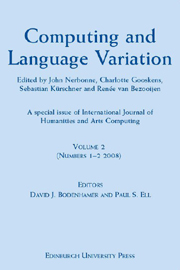Book contents
- Frontmatter
- Contents
- From the Editors
- Notes on Contributors
- 1 Introduction: Language Variation Studies and Computational Humanities
- 2 Panel Discussion on Computing and the Humanities
- 3 Making Sense of Strange Sounds: (Mutual) Intelligibility of Related Language Varieties. A Review
- 4 Phonetic and Lexical Predictors of Intelligibility
- 5 Linguistic Determinants of the Intelligibility of Swedish Words among Danes
- 6 Mutual Intelligibility of Standard and Regional Dutch Language Varieties
- 7 The Dutch-German Border: Relating Linguistic, Geographic and Social Distances
- 8 The Space of Tuscan Dialectal Variation: A Correlation Study
- 9 Recognising Groups among Dialects
- 10 Comparison of Component Models in Analysing the Distribution of Dialectal Features
- 11 Factor Analysis of Vowel Pronunciation in Swedish Dialects
- 12 Representing Tone in Levenshtein Distance
- 13 The Role of Concept Characteristics in Lexical Dialectometry
- 14 What Role does Dialect Knowledge Play in the Perception of Linguistic Distances?
- 15 Quantifying Dialect Similarity by Comparison of the Lexical Distribution of Phonemes
- 16 Corpus-based Dialectometry: Aggregate Morphosyntactic Variability in British English Dialects
From the Editors
Published online by Cambridge University Press: 12 September 2012
- Frontmatter
- Contents
- From the Editors
- Notes on Contributors
- 1 Introduction: Language Variation Studies and Computational Humanities
- 2 Panel Discussion on Computing and the Humanities
- 3 Making Sense of Strange Sounds: (Mutual) Intelligibility of Related Language Varieties. A Review
- 4 Phonetic and Lexical Predictors of Intelligibility
- 5 Linguistic Determinants of the Intelligibility of Swedish Words among Danes
- 6 Mutual Intelligibility of Standard and Regional Dutch Language Varieties
- 7 The Dutch-German Border: Relating Linguistic, Geographic and Social Distances
- 8 The Space of Tuscan Dialectal Variation: A Correlation Study
- 9 Recognising Groups among Dialects
- 10 Comparison of Component Models in Analysing the Distribution of Dialectal Features
- 11 Factor Analysis of Vowel Pronunciation in Swedish Dialects
- 12 Representing Tone in Levenshtein Distance
- 13 The Role of Concept Characteristics in Lexical Dialectometry
- 14 What Role does Dialect Knowledge Play in the Perception of Linguistic Distances?
- 15 Quantifying Dialect Similarity by Comparison of the Lexical Distribution of Phonemes
- 16 Corpus-based Dialectometry: Aggregate Morphosyntactic Variability in British English Dialects
Summary
We are pleased to launch the first of several special issues designed to highlight cutting-edge research, methods, applications, literature, and websites in key fields of humanities and arts computing. The current double issue on variationist linguistics and computational humanities is an exemplar of what we hope to accomplish, especially in shortening the time it takes for important papers to move from initial presentation to publication. Under the guest editorship of John Nerbonne, Professor of Humanities Computing, Charlotte Gooskens, Associate Professor of Scandinavian Languages and Literature, both at the University of Groningen, The Netherlands, Sebastian Kürschner, Tenure track position (‘Juniorprofessur’) in variationist linguistics and language contact at the University of Erlangen-Nürnberg, Germany, and Renée van Bezooijen, Researcher at the University of Groningen, The Netherlands. This issue also introduces a roundtable discussion that we intend to become a regular feature of these special editions. The aim of the forum is to assess contributions to the field and link them to the broader interests of humanities and arts computing, as well as to highlight opportunities for connection and research within and among disciplines.
Over the next year, we will publish two additional thematic issues. Volume 3.1 will focus on humanities GIS. The past decade has witnessed an explosion of interest in the application of geo-spatial technologies to history, literature, and other arts and humanities disciplines. The special issue will highlight leading presentations from an August 2008 conference at the University of Essex and will include two new features – book reviews and website/tool reviews.
Information
- Type
- Chapter
- Information
- Computing and Language VariationInternational Journal of Humanities and Arts Computing Volume 2, pp. v - viPublisher: Edinburgh University PressPrint publication year: 2009
